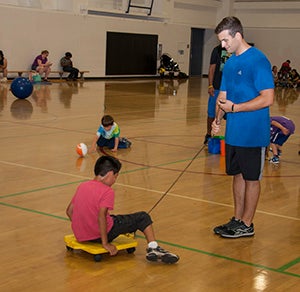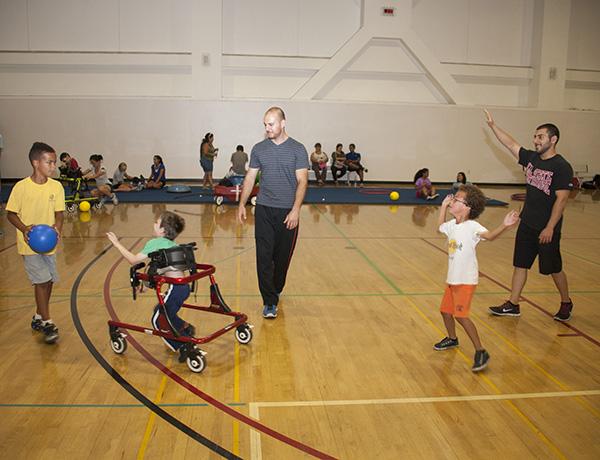The two-year-old S ensory Motor Program is offered by the Department of Kinesiology for five weeks in the summer to children ages 4 to 12. The program, which is free to the community, works on developing the children’s motor skills through physical activities, including jumping, running and handling a ball. The class is a mix of children with typical skills and those with disabilities, including autism, Down syndrome and attention-deficit hyperactivity disorder.
ensory Motor Program is offered by the Department of Kinesiology for five weeks in the summer to children ages 4 to 12. The program, which is free to the community, works on developing the children’s motor skills through physical activities, including jumping, running and handling a ball. The class is a mix of children with typical skills and those with disabilities, including autism, Down syndrome and attention-deficit hyperactivity disorder.
“Motor development is important for students with or without disabilities,” said kinesiology professor Teri Todd, director of the program. “This has been a wonderful opportunity to bring children together who have different skill levels and abilities in a positive, supportive environment.”
Twice a week for 50 minutes, the participants receive one-on-one attention from CSUN undergraduate students enrolled in a kinesiology motor behavior principles class. The students with more severe disabilities work with adapted physical activity kinesiology graduate students who volunteer their time. One of the first things the CSUN students do is assess the children’s skill level in the areas of local motor, object control and body awareness, and rhythm and dance. Instead of having the children simply run, jump or throw a ball, the CSUN students try to make the exercises fun by incorporating them in activities and games like soccer and basketball.
“All the kids are equalized,” said Mark Genderlink ’92 (Sociology), M.A. ’05 (Educational Technology), who has two children enrolled in the program. His 7-year-old son, Carter, has some “social relations” problems, Genderlink said, and his 9-year-old son, Dean, has ADHD.
“They get one-on-one attention and gain some confidence,” Genderlink said.
Shante Morgan, CSUN Today
Su2014

